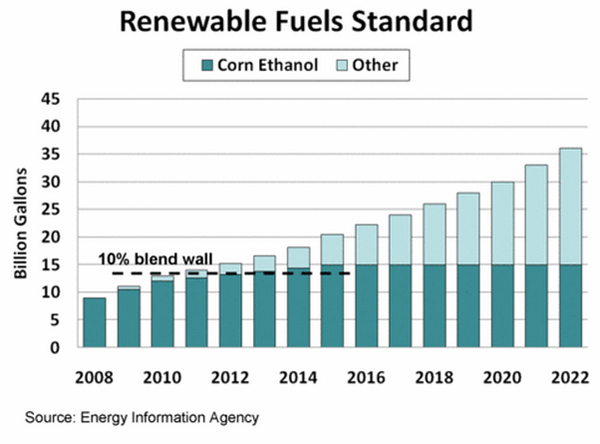EPA Delays Regressive Renewable Fuel Policy
![]() Print this Article | Send to Colleague
Print this Article | Send to Colleague
At the end of November, the U.S. EPA announced it would continue to delay the proposed renewable fuel volume obligations for 2014. This 2014 policy set forth in late 2013 angered many involved with innovation in biofuels and domestic U.S. ethanol production as it would have reduced the percentage of renewables blended into gasoline for automobiles. The new rules could also legitimize a "blend-wall" prohibiting future biofuel capacity from reaching the fuel tanks of cars and trucks through oil company distributers. The figure below shows how new renewable fuels such as cellulosic biofuels are expected to overcome corn ethanol production in the next decade.

After initial protests, the EPA responded, particularly noting that it wanted to proceed with advancements in cellulosic ethanol. The agency said that it "has been evaluating these issues in light of the purposes of the statute and the Administration’s commitment to the goals of the statute to increase the use of renewable fuels, particularly cellulosic biofuels, which will reduce the greenhouse gases emitted from the consumption of transportation fuels and diversify the nation’s fuel supply."
Advanced Ethanol Council Executive Director Brooke Coleman said the EPA’s pullback on the 2014 RFS rule is the right thing to do. "While the cellulosic biofuel industry will not get the policy certainty it needs from this decision, it does suggest that the Administration is listening when it comes to our concerns about giving oil companies too much power to avoid its obligations under the RFS going forward."
Biotechnology Industry Organization President and CEO Jim Greenwood, said the delay continues the atmosphere of uncertainty for the advance biofuel industry. "The RFS supports companies that invest in, build, and start up new advanced and cellulosic biorefineries here in the U.S. It’s clear that the advanced biofuel industry has made rapid strides to increase production capacity to meet the annual volume requirements. Unfortunately, the delay in this year’s rule already has chilled investment and financing of future projects, even as first-of-a-kind cellulosic biofuel plants are right now starting up operations. The industry needs a final rule that is legally appropriate and continues to support our efforts."


